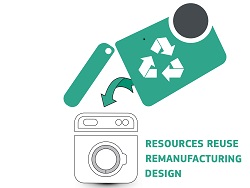Creating a circular economy by cutting out the waste
Globally we generate well over a billion tonnes of waste per year. This represents a huge loss of resources, with many products discarded after use and their value lost. One EU-funded project has come up with ways to hang onto these wasted resources, through reuse and remanufacturing. The framework designed by RESCOM also mitigates business risks such as materials supply and price volatility, and creates new business opportunities for manufacturing industries. The RESCOM team involves 12 organisations including universities, research and consulting organisations, industrial partners, and technology providers, from six EU countries. Project coordinator, Amir Rashid, from Sweden’s KTH Royal Institute of Technology in Stockholm explains that RESCOM is trying to support manufacturing businesses to transit towards a ‘closed loop’ circular economy. ‘The circular economy is a paradigm that is economically and ecologically regenerative by design.’ he explains. ‘To reach that goal, RESCOM uses a framework which simultaneously considers how business models, product design, supply chain and technology dynamically interact and influence the implementation of circular economy approaches.’ This means managing the whole lifecycle of a manufactured product from inception, through engineering design and manufacturing, to service and recovery. The project is achieving its aims through a new software platform that allows manufacturers to improve product design and analyse new business cases to incorporate reuse and re-manufacturing practices. RESCOM assessed its platform using four manufacturing case studies based around its industrial partners. ‘Each study represents a case of transition in manufacturing from linear to circular product systems,’ explains Rashid. The cases included production of a baby stroller, a washing machine, a television and an automotive steering system. ’The scenario for each case study product is different, but all considered incorporating resource conservation approaches such as reuse, remanufacturing and if necessary, recycling,’ says Rashid. The case studies provided several key findings, particularly the importance of upfront product design that incorporates the ‘several lives’ of a product - so there has been preparation for value recovery. It was also important to consider that design and supply chains need to be chosen with a circular manufacturing model in mind. For example, Rashid explains, ‘leasing or product-service models where parts are reused after one use cycle have different design requirements than a conventional sales model where the products do not return to the manufacturer.’ And whilst innovative technology can always improve manufacturing efficiency, the behaviour of users can sometimes be of even higher significance. For example, damage to a product during the use phase is of high relevance. In renting or leasing models, customers might be less careful during use, since they do not own the product. This makes it more challenging to recover products or components after return. In October 2017, a public version of the RESCOM platform will be launched and made available online so businesses can explore the concepts and learn from the project results. By the end of the project, a policy brief will be written with suggestions for decreasing manufacturings dependency on natural resources and to reduce waste. The RESCOM team hope their results will encourage EU policy makers to strengthen current legislation on waste and recycling and try and restrict manufacturing’s future consumption of material resources.
Keywords
RESCOM, circular business model, circular design, sustainability, closed loop, manufacturing waste



